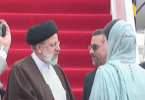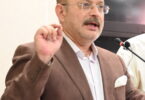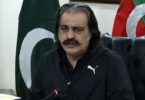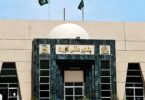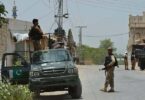F.P. Report
KARACHI: Sindh Chief Minister Syed Murad Ali Shah reiterating his commitment to eradicate polio from the province of Sindh has issued necessary directives to all divisional and district administration and health officers to work hard for administrating polio vaccine and keep their areas clean.
“This is a national war and we have to win it,” he said while presiding over a meeting of Provincial Task Force for Eradication of Polio here at the 7th floor of New Sindh Secretariat Tuesday.
Sindh Chief Minister said that only Pakistan and Afghanistan are left with polio virus stricken countries, otherwise the entire world has been made polio free. “With our pragmatic measures, we have achieved some better result but still polio virus exists in various parts of the province, including Karachi for certain reasons such as high refusal rate, migration of people from Balochistan and Afghanistan to Sindh and inefficient garbage lifting services.
Briefing the chief Minister Provincial Coordinator for Polio Eradication Fayaz Jatoi said that the first polio case of 2017 was detected in August in UC-13 Gulshan-e-Iqbal and another case emerged in November 2017 in UC-4 Gadap, Karachi. At this the chief minister intervened and said it means both the cases have been detected from District East. Fayaz Jatoi replying in affirmative said that the causes are multiple such as most of the parents refuse to give polio vaccine to their children and keep moving from Karachi to polio-positive country such as Afghanistan.
The chief minister directed the Commissioner Karachi to get garbage lifting started in District East, particularly in UC-13 Gulshan and UC-4 Gadap. He also directed Municipal Commissioner Karachi Dr Asghar Shaikh to sit with Secretary Local government and work out a plan to cleanse major nalas of the city. “I want its implementation within 48 hour,” he said.
The chief minister was told that in 2014, there 30 polio cases in the province, including 23 in Karachi. In 2015 the polio cases came down to 12 with seven in the city and in 2016 eight cases were detected, including one in Karachi and in 2017 only two cases have been detected and both were in the city.
It may be noted that in 2014, there were 306 polio cases in Pakistan, of them 30 were in Sindh. In 2015 out of 54 polio cases of the country 12 were in Sindh, in 2016 out of 19 cases eight were in Sindh and in 2017 out of eight polio cases in the country two are in Sindh.
Talking about environmental samples taken from different areas/cities for detecting polio virus, Mr jatoi said that Sukkur city showed positive report in September in 2017, New Sukkur in April, Jacobabad in August and September and then in November, Kambar positive in August, 2017. The areas of Karachi which showed polio positive reports include Sohrab Goth, Machhar Colony, Khamiso Goth (Gadap Town), Chaora Nala, Rashid Minhas (Gulshan Town), Mohammad Khan Colony of Baldia Town, Bakhtawar village – Landhi, Orangi nala area of SITE Town and Korangi Nala area.
Mr Jatoi said that there are 8.6 million children all over Sindh, of the 2.4 million are in Karachi who are being given polio vaccine. The polio teams with proper security administer anti-police vaccine to the children all over Sindh. The children who missed from having polio vaccine in December 2017 were 175,004 of them 129,756 were in Karachi. He said that there were two categories of missed children, those who were not present at their homes and other are those whose parents refused to given polio vaccine to their children. In Karachi the refusal rate in December 2017 remained 7.01 percent while in rest of Sindh it was 0.8 percent .
The chief minister expressed his displeasure on polio positive environmental samples in Kambar, Jacobabad, Dadu and Sukkur. He directed all concerned divisional commissioners to take necessary measures to clean their cities. He directed chief secretary to record performance of all assistant commissioners, deputy commissioners and commissioners in terms of polio eradication in their ACRs. This is a serious issue and “we all have to work in close coordination to save our children from this crippling disease,” he said and added he may make introduce legislation against the refusal of polio vaccine.
The chief minister also directed the commissioners to target water and sanitation interventions in high risk union councils, cleaning of blocked sewage nallas, regular removal of garbage and rehabilitation of water supply.
The meeting was attended by MNA Dr. Azra Fazal Pechuho, Health Minister Dr Sikandar Mendhro,, Principal Secretary to CM Sohail Rajput, IGP AD Khowaja, Ms. Shahnaz Wazir Ali, Mr. Adl IG Karachi Mushtaq Mahar, all divisional commissioners, CEO PPHI Dr. Riaz Memon, DG Health Mr. Tahir Aziz Shaikh, National Team Lead, BMGF Mr. John Agbor, National Team Lead, Unicef Dr. Abdi-Abdu-Rehman, National Team Lead, WHO Dr. Kamaluddin Soomro, National TL, NSTOP and others.
Sindh Chief Minister Syed Murad Ali Shah has awarded time scale to 28971 employees of Irrigation department.
The irrigation department had moved a summary saying that 28971 employees were appointed against non-promotional posts, therefore they may be given time scale and service structure.
The chief minister approved the to grant time scale to the employees of irrigation department from grade B-1 to grade B-15 and the financial implication of the up gradation comes to Rs516.3 million per annum.
The chief minister congratulating the employee.

